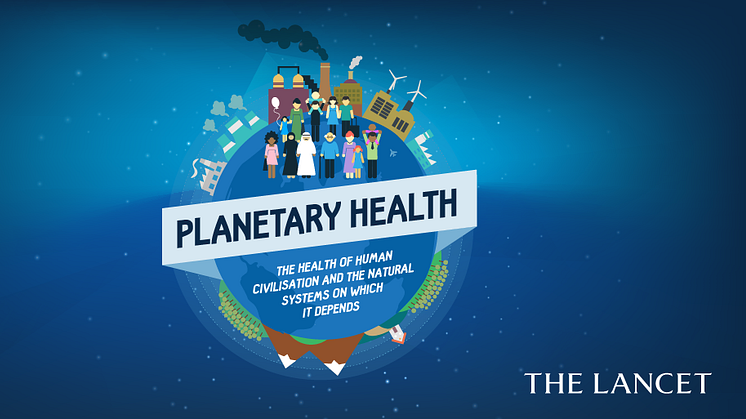
Press release -
Discovery releases The Rockefeller Foundation-Lancet Commission report on Planetary Health
Evidence indicates that human activities are jeopardising Earth’s natural systems and the health of future generations.
The Planetary Health report, released by Discovery in Johannesburg and simultaneously in Manila, New York and London on 16 July, provides the first comprehensive evidence showing how unprecedented environmental degradation is jeopardising the health of future generations. As the global population increases, overuse of natural resources and unsustainable consumption patterns will continue to negatively affect the health of the environment on which humans rely. What’s more, the world’s poorest communities, those living in areas that are most affected and those with greater sensitivity to disease and poor health will be at greatest risk.
The premise of the new report on planetary health is that human health is intricately connected with the health of natural systems.
“For millennia, humanity has pursued material needs with little understanding and consideration of the wider long-term impacts on the planet and health,” says Umezuruike Linus Opara, Distinguished Professor of Postharvest Technology & DST-NRF South African Research Chair at Stellenbosch University. He argues that through multi-lateral actions, we need new innovations in leadership and technology to chart a new course. “Nowhere are these most apparent than the global food system, with more than a third of food produced lost or wasted without contributing to human nutrition,” says Opara.
Projections estimate that the world’s population could increase from the current 7.2 billion to up to 13.2 billion by 2100. This significant increase has the potential to put severe strain on natural systems that produce our food and water. Urban water shortage projections show those affected are expected to increase from 150 million to 1 billion by 2015, due to growth in urban populations. Currently, food and water security measures are undermined by poor food management practices, resulting in 30-50% food wastage. The five times increase in biofuel production from 2001 to 2011 has also put strain on food supplies, as crops used to make biofuel would otherwise be utilised for food production.
Furthermore, food and water security and the additional strain of soil erosion, ocean acidification, and biodiversity loss on natural systems, are exacerbated by human activities which increase climate change.
Despite these challenges, the report outlines various approaches to ensure environmental sustainability. “There are substantial opportunities to reduce the impact humans have on environmental systems, opportunities to adapt to the changes that are inevitable and thereby improve overall human health,” says Derek Yach, Head of The Vitality Institute and Commissioner to the report.
Probably the most important way to address environmental degradation, says Yach, is to appeal to individuals for action. “The good news is that dietary prescriptions addressing many chronic diseases – now the dominant contributor to the burden of disease worldwide – are also good for the planet. In particular, dietary shifts towards consuming large amounts of beef, palm oil, ultra-processed foods, and refined carbohydrates contribute to the disease burden as well as to greenhouse gas emissions, land use change (especially deforestation), and excess water use. We know this from Discovery’s own evaluation of the dietary and environmental impacts of its Vitality HealthyFood benefit. Our study of over 300 000 participants’ changes in diet showed that healthier diets are more sustainable.”
The Planetary Health report argues that promoting healthy, low-environmental-impact diets is an important behaviour change with significant potential positive effects on environmental systems as well as on human health. For instance, large numbers of premature deaths are due to inadequate consumption of vegetables, fruit, and nuts. These food sources are not only healthier but also have less of an environmental impact. Sustainable dietary guidelines bridge the gap between addressing non-communicable diseases and environmental sustainability, as reported in the 2014 Institute of Medicine Sustainable Diets workshop summary.
Discovery Vitality’s HealthyFood benefit includes a range of vegetables, fruits, starchy foods, lean protein, fat free dairy products, legumes, and healthy fats and oils. The foods in the Pick n Pay and Woolworths HealthyFood catalogues are selected to address high-risk dietary practices that are associated with non-communicable diseases like diabetes, high blood pressure, and high cholesterol. The benefit incentivises or rewards the purchase of the healthy foods in the catalogue by offering cash back and Vitality points for each item purchased.
A study of the Discovery Vitality HealthyFood benefit showed that not only did participants increase their purchases of fruit and vegetables by 5.7-8.5%, but also decreased their purchases of sugary and fatty foods by 5.6-7.2%. The study also showed a decrease in beef and pork purchases; this represents an 8-13% decrease in land requirements, a 7-12% decrease in water usage, and an 8-10% decrease in greenhouse gas emissions.
The United Nations has described the meat industry as ‘one of the most significant contributors to the most serious environmental problems, at every scale from local to global.’ Incentivising individuals to adopt a healthier pattern of consumption that includes more plant-based foods and fewer meat products can therefore have a significantly positive effect on environmental wellbeing. Yach argues that change will not happen unless individuals at the point of purchase make a decision that can have an impact on their lives, on their health and on the environment.
Dr David L Katz, Director of the Yale University Prevention Research Centre and advocate for environmentally considerate dietary recommendations argues that, “We do not have a choice between sensible dietary guidelines that include, or exclude sustainability. We only really have a choice between sensible guidelines that address sustainability, and senseless guidelines that dismiss the obvious. We only really have a choice between protecting our kids’ food and water, and consuming it all. We only really have a choice between addressing a clear and present danger, and the short-sighted stupidity of ignoring it. In other words, we don’t really have any choice at all.”
ENDS
Notes to editors:
A Commission of 15 leading academics and policymakers from institutions in eight countries, including the Head of The Vitality Institute, Dr Derek Yach, wrote the report titled “Safeguarding human health in the Anthropocene epoch”.
For additional media resources, including infographic, executive summary and media brief see:
https://www.dropbox.com/sh/gcb2cwkau06tioj/AABLejbJTYArizSHomj57Ayka?dl=0
The above link is for journalists only; if you wish to provide a link to this publication for your readers, please use the following URL:
http://www.thelancet.com/commissions/planetary-health
For more information and media queries contact Taryn Kerr:
011 529 2204
(+27) 082 780 9185
Topics
Categories
Discovery information
About Discovery Limited
Discovery Limited is a South African-founded financial services organisation that operates in the healthcare, life assurance, short-term insurance, savings and investment products and wellness markets. Founded in 1992, Discovery was guided by a clear core purpose – to make people healthier and to enhance and protect their lives. Underpinning this core purpose is the belief that through innovation, Discovery can be a powerful market disruptor.
The company, with headquarters in Johannesburg, South Africa, has expanded its operations globally and currently serves over 4.4 million clients across South Africa, the United Kingdom, the United States, China, Singapore and Australia. Discovery recently announced an intent to partner with Generali, a leading insurer in Europe, and has partnered John Hancock in the US. These new partnerships will bring Discovery’s shared-value business model to protection industries in Europe and the US.
Vitality, Discovery’s wellness programme, is the world’s largest scientific, incentive-based wellness solution for individuals and corporates. The global Vitality membership base now exceeds three million lives in five markets.
Discovery is an authorised financial services provider and trades under the code “DSY” on the Johannesburg Securities Exchange.
Follow us on Twitter @Discovery_SA







